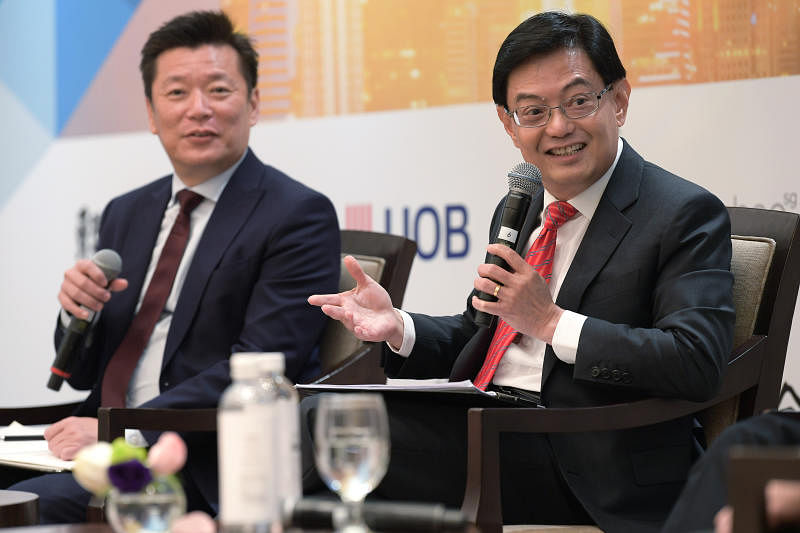Singapore companies, including rivals, can team up to expand overseas: Heng Swee Keat
Sign up now: Get ST's newsletters delivered to your inbox

Finance Minister Heng Swee Keat speaks while Lianhe Zaobao and Lianhe Wanbao editor Goh Sin Teck looks on during an annual post-Budget forum organised by Lianhe Zaobao on March 8, 2019.
ST PHOTO: NG SOR LUAN
Ng Jun Sen
Follow topic:
SINGAPORE - Local companies seeking to break into foreign markets must team up instead of treating each other as rivals, Finance Minister Heng Swee Keat said on Friday (March 8).
This would enable them to tap the potential of South-east Asia which, by 2030, is expected to be the fourth biggest economic region in the world, he said in Mandarin at at an annual post-Budget forum organised by Lianhe Zaobao.
The forum came as Parliament approved the spending of the ministries under this year's $80 billion budget after a nine-day debate.
As one of four panellists at the event, Mr Heng urged businesses to set aside their differences and see the benefits of partnerships.
"For industries to transform, depending on the Government alone is not enough," he said.
Several members on the panel and in the audience also pointed out that while the local market might be small, the regional market and population was still growing. So companies seeking growth had no choice but to venture overseas.
But some business leaders said alliances between local companies when abroad do not happen easily.
Mr Derrick Yap, chief executive of precision engineering company PBA Holding, observed that Singapore firms tended to see their compatriots as rivals when expanding abroad.
These companies are so used to competing with one another in the small domestic market that when they venture overseas, they continue to compete, he added.
Panellist Douglas Foo, president of the Singapore Manufacturing Federation, said this was counterproductive: "With South-east Asia growing in importance, the cake is bigger now. It is no longer about competing with each other but how to share that cake."
Mr Heng shared a related incident from the days when he was a permanent secretary for Trade and Industry. He said that when some Singapore firms needed more booth space at a trade fair in Germany, he advised them to team up and negotiate together. They refused, as they saw each other as rivals.
"Yes, they are competitors in Singapore, but not overseas," he said.
Agreeing, Mr Png Cheong Boon, chief executive of Enterprise Singapore, said business partnerships have paid off, with trade associations leading the way and curating how the companies could build off each other's strength.
Several entrepreneurs at the session said it was hard to transform their businesses. They cited Singapore's shrinking workforce, strong foreign competition and fears that the transformation effort was not worth the initial investment.
Singapore Chinese Chamber of Commerce and Industry president and panellist Roland Ng said many bosses drag their feet, as transformation would not resolve their manpower woes right away.
"Without a push, these bosses will not act," said Mr Ng, referring to the impending tightening of foreign worker quotas in the service sector.
Mr Heng said the move to avoid over-reliance on foreign labour is a necessary one that can also drive companies to upgrade their workers' skills.
Panellist Teo Siong Seng, chairman of the Singapore Business Federation, said the move could hit firms with inefficient processes, while Mr Foo said some firms could be driven out of business. Both asked the Government to be flexible in implementing the quota, but agreed it was necessary.
"Controlling foreign worker inflow is a bitter pill that needs to be eaten, sooner or later," said Mr Foo.

